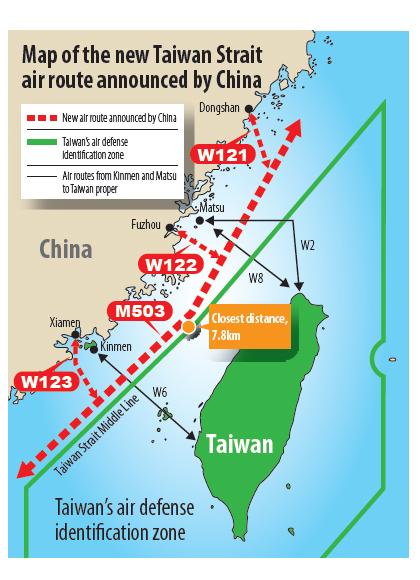Legislators across party lines yesterday said new flight routes announced by China are testing the nation’s bottom line and that peace across the Taiwan Strait will be difficult to keep if the government does not confront Beijing head on over the matter.
On Monday, China announced via the International Civil Aviation Organization new commercial flight routes just to the west of the median line of the Taiwan Strait, an act said to pose risks to Taiwan’s air safety and defense.
While, the Ministry of National Defense and the Civil Aeronautics Administration on Tuesday took a firm stand against the move, the Mainland Affairs Council (MAC) has made relatively soft remarks on it, merely calling it “unacceptable” and urging China to engage in further negotiations.

SOURCE: CAA
MAC Vice Minister Wu Mei-hung (吳美紅) yesterday said that the two sides should maintain friendly and positive interactions, and that cross-strait talks should continue.
Taiwan Solidarity Union (TSU) Legislator Chou Ni-an (周倪安) yesterday lambasted the council, saying its attitude is soft, since the routes should have been decided after sufficient communication between the two nations.
The council should make its objections plain, or it would be tantamount to forfeiting national sovereignty, Chou said.
Chou said the council should suspend the issuing of landing visas in Kinmen County for Chinese visitors and the “small three links” (三通) until cross-strait negotiations are held to deal with Beijing’s announcement.
Chinese Nationalist Party (KMT) Legislator Lin Yu-fang (林郁方) said that with China carrying out reclamation projects in the South China Sea and having its military vessels sail through disputed waters to flex its military muscles and showcase its ambitions, it will become more difficult for the government to keep cross-strait peace if it does not demonstrate its strong discontent over the routes.
Democratic Progressive Party (DPP) Legislator Chen Chi-mai (陳其邁) said Beijing unilaterally established the new routes in the face of the President Ma Ying-jeou (馬英九) administration because it has become impatient with obstructions to cross-strait negotiations and the KMT’s drubbing in last year’s nine-in-one elections.
DPP Legislator Tsai Huang-liang (蔡煌瑯) criticized the council, accusing it of trying to avoid the problem.
Future cross-strait negotiations might be held under the “one China” regime if the government does not toughen up this time, Tsai said.
Meanwhile, TSU chairman Huang Kun-huei (黃昆輝) said China is pressing aggressively toward Taiwan, not only in terms of its missiles targeting the nation, but now in the civil aviation arena.
DPP Chairperson Tsai Ing-wen (蔡英文) said during a meeting of the party’s Central Standing Committee that China’s action would have great impact on cross-strait flight safety, national security and sovereignty, adding that the move is extremely disrespectful to Taiwan and in violation of the spirit of the Convention on International Civil Aviation.
It also risks incurring changes to the cross-strait “status quo” and peace, Tsai Ing-wen added.
It is unacceptable to Taiwanese that while the Ma administration has been touting its efforts in cross-strait relations, it failed to see this coming, she said, adding that the DPP demands that the government lodge a firm protest with Beijing.

CHAOS: Iranians took to the streets playing celebratory music after reports of Khamenei’s death on Saturday, while mourners also gathered in Tehran yesterday Iranian Supreme Leader Ayatollah Ali Khamenei was killed in a major attack on Iran launched by Israel and the US, throwing the future of the Islamic republic into doubt and raising the risk of regional instability. Iranian state television and the state-run IRNA news agency announced the 86-year-old’s death early yesterday. US President Donald Trump said it gave Iranians their “greatest chance” to “take back” their country. The announcements came after a joint US and Israeli aerial bombardment that targeted Iranian military and governmental sites. Trump said the “heavy and pinpoint bombing” would continue through the week or as long

TRUST: The KMT said it respected the US’ timing and considerations, and hoped it would continue to honor its commitments to helping Taiwan bolster its defenses and deterrence US President Donald Trump is delaying a multibillion-dollar arms sale to Taiwan to ensure his visit to Beijing is successful, a New York Times report said. The weapons sales package has stalled in the US Department of State, the report said, citing US officials it did not identify. The White House has told agencies not to push forward ahead of Trump’s meeting with Chinese President Xi Jinping (習近平), it said. The two last month held a phone call to discuss trade and geopolitical flashpoints ahead of the summit. Xi raised the Taiwan issue and urged the US to handle arms sales to

BIG SPENDERS: Foreign investors bought the most Taiwan equities since 2005, signaling confidence that an AI boom would continue to benefit chipmakers Taiwan Semiconductor Manufacturing Co’s (TSMC, 台積電) market capitalization swelled to US$2 trillion for the first time following a 4.25 percent rally in its American depositary receipts (ADR) overnight, putting the world’s biggest contract chipmaker sixth on the list of the world’s biggest companies by market capitalization, just behind Amazon.com Inc. The site CompaniesMarketcap.com ranked TSMC ahead of Saudi Aramco and Meta Platforms Inc. The Taiwanese company’s ADRs on Tuesday surged to US$385.75 on the New York Stock Exchange, as strong demand for artificial intelligence (AI) applications led to chip supply constraints and boost revenue growth to record-breaking levels. Each TSMC ADR represents

State-run CPC Corp, Taiwan (CPC, 台灣中油) yesterday said that it had confirmed on Saturday night with its liquefied natural gas (LNG) and crude oil suppliers that shipments are proceeding as scheduled and that domestic supplies remain unaffected. The CPC yesterday announced the gasoline and diesel prices will rise by NT$0.2 and NT$0.4 per liter, respectively, starting Monday, citing Middle East tensions and blizzards in the eastern United States. CPC also iterated it has been reducing the proportion of crude oil imports from the Middle East and diversifying its supply sources in the past few years in response to geopolitical risks, expanding